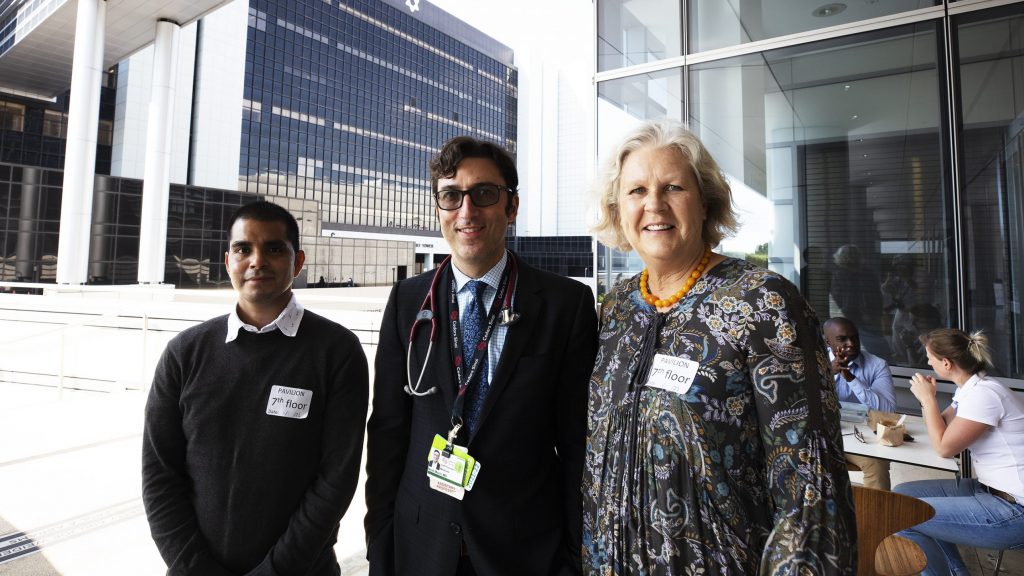Diego sat up wearily in the hospital bed that had been a position of purgatory for him too many times already.
It was early January 2020. A bone marrow transplant at Cedars-Sinai Medical Center to prevent the return of his lingering lymphoma had been delayed again. Reeling from chemotherapy treatments and transfusions, Diego saw another window of opportunity closing, his future again uncertain.
Carol Sanborn, who doctors and staff had come to know as his “American mom,” realized by this point Diego wasn’t fond of hospital food, so she brought him wonton soup from a local eatery. Opening a fortune cookie on his meal tray, Diego pulled out the small paper scroll: “You are guided by silent love and friendship around you.”
As much as he had relied on his Catholic prayer life to alleviate anxiety, that message was one Diego had come to profoundly learn to be true.
There is a remarkable story all in itself about how this 29-year-old undocumented immigrant took the treacherous journey nine years earlier from a small mountainous village in Guatemala. After seven years working in Colorado, an urgent diversion to Los Angeles for lifesaving treatment meant putting trust in strangers and doctors to give him a better chance of survival.
Ultimately, the young immigrant’s unlikely survival came thanks to three people who accompanied him on his journey, and who discovered in Diego an answer to their own prayers.
Erin Meaney, a freelance journalist teaching English in Colorado, befriended Diego when he became one of her students in 2014. For his primary language, Diego spoke Chuj, one of a dozen Mayan dialects. Spanish was his second language.
Meaney, like many others, was drawn into Diego’s backstory.
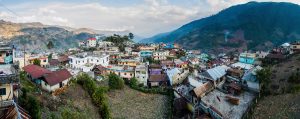
In 2012, he left San Mateo Ixtatán in Guatemala’s Cuchumatanes Mountains, convincing his parents to use their home as collateral so he could borrow $7,000 to pay a human smuggler to help him join his older brother at a Colorado resort town. The dream was to make enough money to return to Guatemala and help his grandmother, parents, brothers, and his new young daughter construct a multigenerational house.
Traveling some 3,000 miles by foot, bus, and car, Diego waded across the U.S. border at the Rio Grande River in a life preserver. A vehicle that was supposed to take him farther crashed, and he was sequestered in a house with 20 others while he waited for his brother to pay the coyote an additional $1,900 to secure his release.
Diego made it to Colorado on Christmas Eve in 2013. His plan of living with his older brother was cut short when the latter was picked up by immigration officials. That left Diego on his own to work in the kitchen of a restaurant.
As Diego lived and worked in a resort town with a sizable population of Guatemalan and Mexican immigrants, Meaney became a trusted friend. In September 2018, they ran into each other on the street. Diego admitted he had just left work early and wasn’t feeling well. A month later, Diego texted her, saying he was getting sicker and more scared.
His boss, the restaurant’s chef, was alarmed by Diego’s rapid decline and made a two-hour-plus journey with him to a regional hospital, without health insurance. By the time he was airlifted quickly to a hospital in Denver, Diego was unconscious, and his condition was listed as grave: He was facing respiratory issues, failing liver and kidneys, and low cardiac function. He was covered in a fungal skin infection and often not lucid.
The diagnosis was Natural Killer/T-cell Lymphoma, or NKTL.
After six months of extensive chemotherapy, Diego was declared cancer-free in late February 2019. But before his discharge, his social worker warned he would need a bone marrow transplant or the cancer could return. Without a transplant, a relapse could come in a few months.
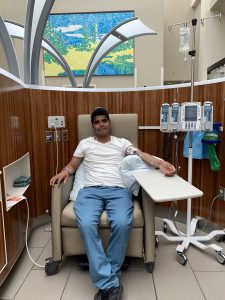
Diego’s immigration status prevented the Denver hospital from performing the transplant. Staff there recommended the UCLA Medical Center in Los Angeles.
“I was really at a loss,” said Meaney, who with others in the community had fundraised to provide Diego support and resources. “Diego had come to rely on his Catholic faith to help him during these difficult times.”
With that in mind, Meaney did a Google Maps search of every Catholic church within 15 miles of UCLA.
“I emailed each one, explained Diego’s situation, and asked if they could provide any assistance in finding Diego a place to live while he underwent the BMT.”
Only one church replied: St. Monica in Santa Monica. The parish secretary referred Meaney to Lorri Perreault, a regional director at Catholic Charities of Los Angeles who did years of outreach in Guatemala and even adopted a daughter there.
“Reaching Lorri was a complete shot in the dark — and it worked,” said Meaney.
Perreault connected with Carol Sanborn at the neighboring parish of Corpus Christi in the Pacific Palisades to see what could be done. Sanborn assumed she would be able to help by matching up parishioners to transport Diego to doctor visits, and maybe even have Diego stay at her home with her husband, Scott, himself a doctor, for a short while.
That would turn into a two-year-plus caretaker role that the Sanborns came to embrace.
On Ash Wednesday 2019, Diego’s discharge from the Denver medical facility meant that, with ashes still on his forehead, he would travel with Meaney on an 18-hour drive to LA.
“I was very confused,” said Diego. “When I was done at that hospital, I wanted to visit my family in Guatemala. But now I’m thinking, I’m going to Los Angeles? I have no family there. Erin said she could help me with wherever I wanted to go. I cried almost every day.”
“It was a crazy plan,” Meaney admitted, “but we genuinely had no other options.”
When they got to LA, another option vanished, too: Due to several reasons, including Diego’s undocumented status, UCLA could not take him into its transplant program.
But an official at UCLA Health acted quickly and arranged for nearby Cedars-Sinai to take over, where hematologist and oncologist Dr. Noah Merin worked to get Diego on a path to a transplant.
He listened to Diego’s story. Merin was struck by the irony of it all: a Jewish hospital embracing the efforts of Catholic Charities to make this work, with a facility willing to do transplants for undocumented patients.
“Dr. Merin’s plan was always: We’re going to push but we’re not going to rush,” said Sanborn. “He was extraordinary in the way he saw Diego for the person he is.”
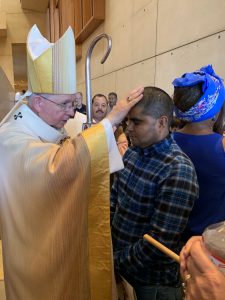
Now came Perrault’s turn to put her experience — those years in Guatemala — to use. Diego needed a bone marrow donor, and family members are considered the best match. Diego’s were all in Guatemala, and U.S. travel restrictions meant bringing them to LA was out of the question.
On 24-hour notice, Perreault took a red-eye flight sponsored by Catholic Charities. In Guatemala City she met Diego’s family: all four of his brothers, his mother, and his daughter. They had taken a 14-hour ride in a chicken bus from their village to meet Perreault, who packed specimen lab kits and swabbed all the brothers’ cheeks. All four tested eligible to be Diego’s donor.
The transplant coordinator at Cedars-Sinai worked with the nonprofit National Marrow Donor Program, and its Be The Match registry, to fly Diego’s two brothers to Mexico City. His youngest brother would become the donor, the second brother the backup. They spent three weeks in Mexico City, where the bone marrow was collected, frozen, and shipped to Cedars-Sinai.
But as all that took time, Diego relapsed, needing a half-dozen more critical hospital visits to regain remission and prepare again for the transplant.
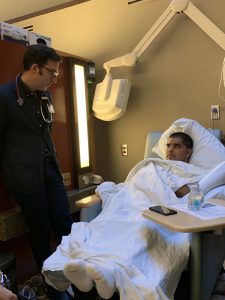
On Dec. 12, 2019, the feast day of Our Lady of Guadalupe, the marrow transplant was set. But Diego’s fever spiked and his liver was not strong enough to receive the transplant.
The procedure was postponed to March 2020, the month of the initial coronavirus lockdown.
“Whenever we had some bad news delivered, Diego would always say, ‘We’ll find a plan,’ ” said Sanborn. “His faith was so humbling to all of us. And we saw that as anyone who came to meet him in all this, they, too, fell in love with him. They weren’t helping to do us favors, they wanted Diego in the best place.”
On June 4, 2020, a transplant was finally arranged. Diego managed through the 100 critical days of the post-transplant possible rejection period, losing 80 pounds in the process. He carried a lunch box with dozens of prescription medications he needed.
Meanwhile, Sanborn, director of pastoral ministry at Corpus Christi, introduced Diego to St. Anne’s Church in Santa Monica so he could integrate with a more Spanish-speaking community. He attends Sunday Mass each week as well as Wednesday adoration.
Diego wanted to receive the sacrament of confirmation, which he did at St. Anne’s in August 2020. It came just days after needing emergency gallbladder surgery, the result of his body trying to metabolize all the minerals from transfused blood.
A few months later in December, Diego tested positive for COVID-19, and despite having minimal symptoms, Merin arranged for a monoclonal antibody infusion for Diego, who recovered from the virus with few side effects.
Today, all three women — Meaney, Perreault, and Sanborn — agree that Diego helped them more than they helped him.
In the case of Meaney, herself a Catholic, Diego’s experience was a constant reminder of “the power of faith.”
“I knew Diego would not have a great outcome if he didn’t get the transplant, and if Lorri hadn’t responded to my email and included Carol to take up the cause, I would have lived the rest of my life knowing I failed Diego,” she told Angelus in a Zoom interview with Perreault, Sanborn, and Diego. “They all have impacted quite literally how I’ll live the rest of my life.”
Sanborn said that during a time marked by wildfires, earthquakes, and COVID-19, “it’s good to see so many good people stepping forward doing small and large things.”
“You don’t get many chances in your life to do something that you know for certain is going to not only change someone’s life but also give them a life,” she said.
Perreault admitted that her meeting Diego came “at the darkest time in my life, where I was overwhelmed with a number of serious family struggles.”
“Nothing else makes sense to me except that God placed Diego in my path for a big reason,” said Perreault, who said Diego’s journey “inspired me, humbled me, clarified my vision of what love is.”
“We had many moments of crying together, him for me, me for him, tears of support and love,” added Perreault. “He saved me and I did a very small part in saving him.”
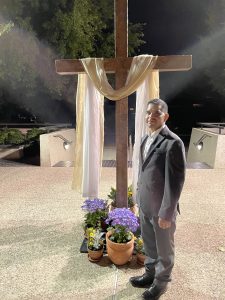
As Diego receives a series of vaccines to rebuild his immune system, his plan of action is back to where it was years ago: Work at a local restaurant, save money, and return to Guatemala to help finish building his family’s home.
“I have a daughter I haven’t seen in eight years and I’m sad,” said Diego. “Thank God I’ve been feeling good. I want to buy my family things for their house: windows, floor, a roof. It is hard for me to think of going back now if I might have to return the way I did before.”
Asked how grateful Diego might be for the help he has received from the three women he had met along the way, he struggled a bit with the English translation of that word.
“Grateful … it means to say thank you?” he asked. “I don’t want to just say thank you to one person. Erin and Lorri and Carol have been amazing help for me.
“I want to thank you all for coming together. We have done a lot of hard work in the past. Now we’re in the present and we don’t know what’s in the future.”
Editor’s note: Angelus chose to withhold Diego’s last name to respect his privacy.
